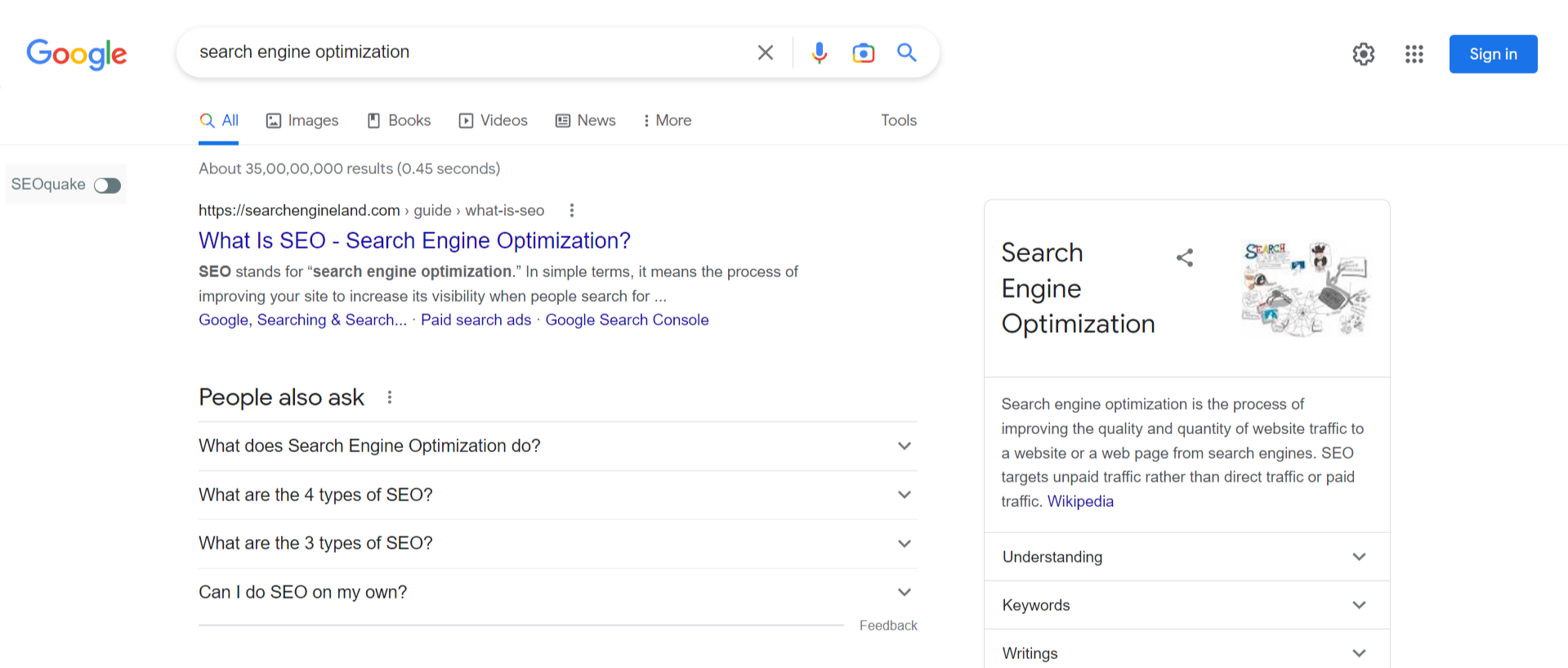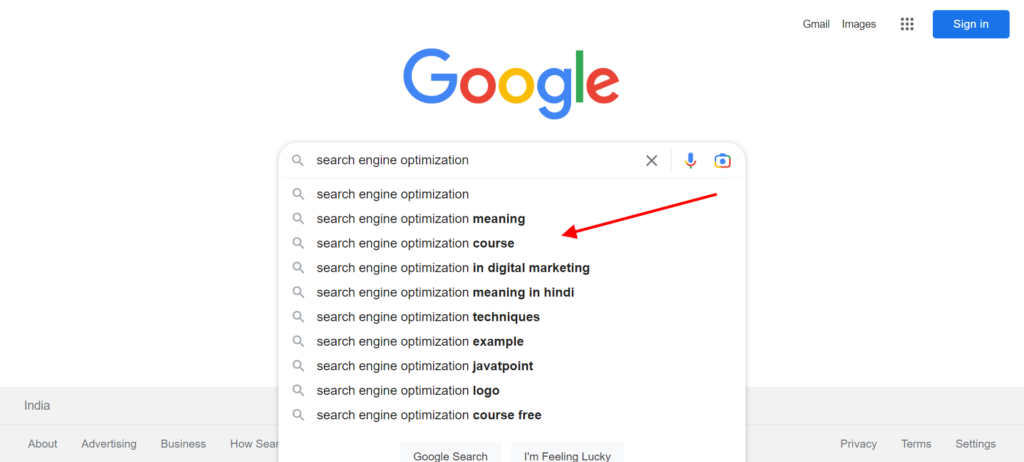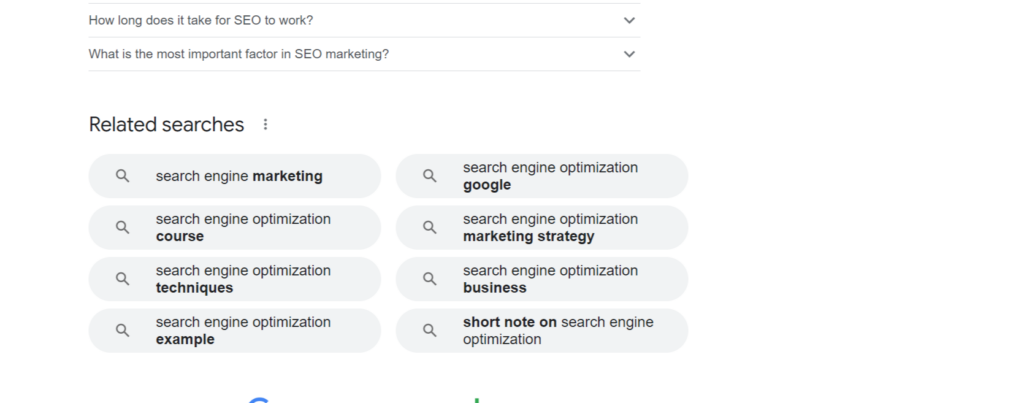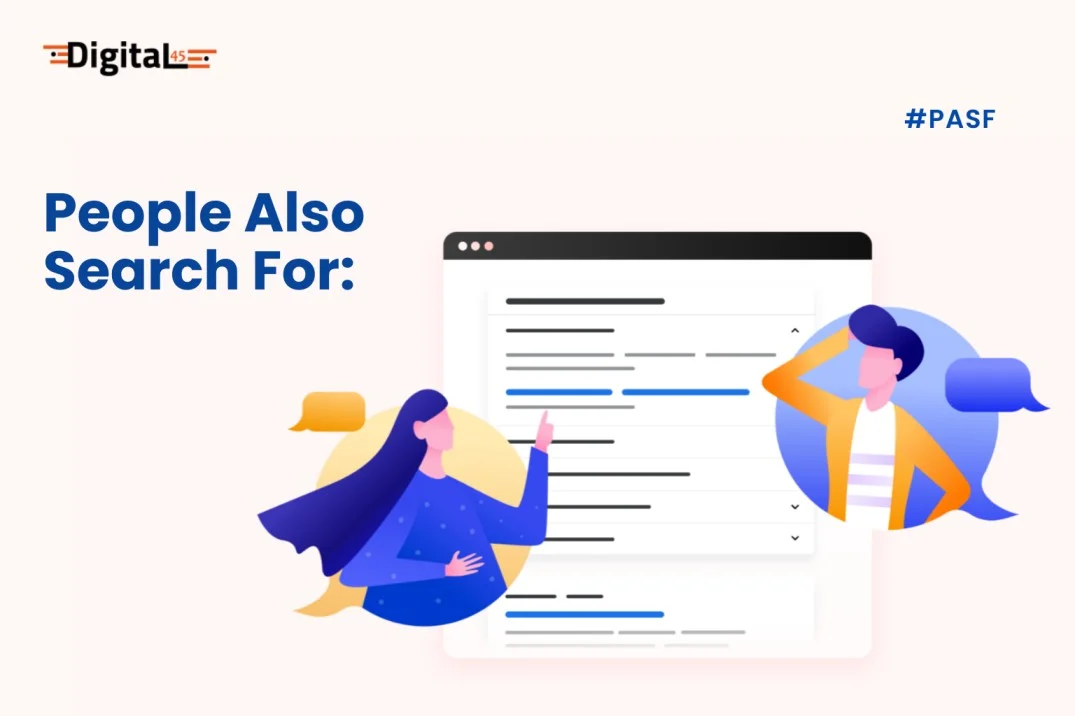People Also Search For (PASF) is a Google feature that displays a long list of related search terms in the right-hand column of a SERP.
These are based on what people searched for on Google, and they include words or phrases that are relevant to the term being searched but didn’t show up in the results. Thus it’s crucial to hire the Result Oriented SEO Company who can help you out in ranking.
What are People Also Search For keywords?
People Also Search For keywords are the keywords that Google shows in the People Also Search For box. The term refers to any keyword that has a lower search volume than your main keyword but still has some relevance.
Google shows this box at the bottom of the search results for you to see and for you to potentially target.
PASF keywords are a great way to find new topics to target since they aren’t as competitive as your main keyword.

This box is one of the best tools Google has to help you find new topics to target. In addition, it’s a great way to increase your click-through rate (CTR) because it shows people who are interested in your topic that they aren’t alone.
The People Also Search For the box is a great way to find new topics to target since they aren’t as competitive as your main keyword.
This box is one of the best tools Google has to help you find new topics to target. In addition, it’s a great way to increase your click-through rate (CTR) because it shows people who are interested in your topic that they aren’t alone.
People Also Search For (PASF) vs People Also Ask (PAA)
- PASF is a feature of Google that shows related search queries entered by other people.
- PAA is a type of PASF, and it specifically refers to the practice of looking at similar searches as part of your SEO strategy.
- You can use PASFs to find people and also ask for searches because these are often related to things you’re trying to rank for, too.
What do People Also Search For mean on Google?
When you do a search on Google, you might notice that the top of your results page contains a box called People Also Search For. The PASF is a handy tool for discovering related searches that people have done in the past.
 These are not just random questions that people had asked but rather actual terms and phrases used by searchers when they were looking for something similar to what you’re searching for right now.
These are not just random questions that people had asked but rather actual terms and phrases used by searchers when they were looking for something similar to what you’re searching for right now.
The PASF can be found at the top of every Page 1 result list on Google search engine results pages (SERPs), and it displays five “popular” related searches directly underneath your main query result.
What does Google say about the People Also Search For box?
According to Google, the People Also Search For the box is a way for people to find what they are looking for. Though, it’s not as simple as that. Let’s break down this statement and see if we can get a real understanding of how it works.
- “People” – This means that Google is taking into account all of the searches made on their site, not just those made by you or me at our desktops and laptops but also those done by people using mobile phones who aren’t logged in (e.g., your mom surfing from her phone) which brings up another point:
- “Searches” – This isn’t just about queries with keywords in them; rather, there are several factors that impact whether or not something shows up in this box:
 If someone had visited a page before (i.e., if there was some sort of activity associated with it), then it’s more likely that something will show up here because users have already shown interest in whatever topic comes next in line after we click through from SERPs; however, the more specific and nuanced these queries are when compared against other related ones could lead us back down the rabbit hole again!
If someone had visited a page before (i.e., if there was some sort of activity associated with it), then it’s more likely that something will show up here because users have already shown interest in whatever topic comes next in line after we click through from SERPs; however, the more specific and nuanced these queries are when compared against other related ones could lead us back down the rabbit hole again!
People Also Search For statistics
People Also Search For (PASF) is a feature in Google search results that shows you what other people also searched for when they found the page you’re on.
This feature gives you additional information about a topic, which can help you decide if it’s something that interests you. For example, if I search for “dog breeds,” PASF will show me not just the most popular dog breeds but also related searches like “small dogs” and “big dogs.”
PASF is a great way to learn about topics that interest you. It can also help you find information on subjects that are new to you, like if you’re looking for the best puppy food for your new dog.
However, PASF isn’t always a helpful tool. If you’re looking for specific information on a subject, then the related searches won’t help you much. For example, if I search for “cats,” PASF will show me popular cat videos as well as related searches like “cat breeds” and “how to take care of cats.”
Tools to find People Also Search For keywords
There are a number of tools that can help you find People. Also, Search For keywords.
- Use Google’s SERP (search engine results page). When you conduct a search on Google, check out what the blue link area at the bottom of the page displays. This is where people will go if they click through from another website. You can use this information to find some great long-tail keywords that aren’t getting as much attention as they should.
- Keywords Everywhere is an extension for Chrome that gives you all kinds of data about SERPs and keywords, including how many people also searched for them and how many websites rank in those searches. It’s an excellent way to get ideas for new content or even research competition if you’re considering targeting certain long-tail phrases.
- Ahrefs is another great tool for ranking analysis; it includes sections where you can see which terms people are searching for most often when visiting your site and which ones lead them there (as well as how many links lead back from those sites).
Google’s SERP
Google SERP is the page you see when you search for something on Google. It’s a real page, not just a theoretical one. In other words, it’s the actual name of the result set that shows up when you search Google.
Google SERPs are kind of like those generic pages that exist on every website—they contain links to related content and other stuff like images or text ads (called “ads”). You can think of them as pages where people go to find answers about something they want to know about or buy online.
The SERPs are the result set that shows up when you search Google. The “SERP” stands for Search Engine Results Page. It’s the page you see when you search for something on Google. It’s a real page, not just a theoretical one. In other words, it’s the actual name of the result set that shows up when you search Google (or any other search engine).
Keywords Everywhere
Keywords Everywhere is a Chrome extension that displays keywords, related search terms and top domains on any web page.
It can be used to find the best keywords to target in your content by looking at the most popular searches for that particular topic.
It’s a great way to find the best keywords for your content and see what others are writing about in your niche. It also shows you the top domains that are ranking for those particular keywords, so you can see how they’re doing it.
The extension is available on the Chrome Web Store, and it’s free to use.
Ahrefs
Ahrefs is a powerful tool for finding PASF keywords. It can help you find the right keywords and their associated search volume, as well as related keywords and more. Let’s take a look at how it works:
- Go to Ahrefs and click on “Keyword Explorer” from the left menu bar.
- Type in your product or service category into the search box and hit enter (e.g., “SEO tools”). The results will show all of the relevant SEO tools mentioned in search results across all domains over time, including information about their ranking positions and daily visits/monthly visits/yearly visits metrics.
How to rank for PASF keywords?
As you’re going through your keyword research, you’ll want to make sure that you find keywords that have high search volume. This is because the more people search for a keyword, the more opportunity it has to drive traffic and conversions.
In addition to high search volume, you should also look for keywords with low competition. The fewer competing websites for a particular keyword phrase, the more likely it is that yours will rank well on the SERPs.
Finally, check out the commercial intent in your results. Keywords with good commercial intent are ones where users are looking for something specific—such as “buy blue jeans online” or “Find used cars near me.”
Finding PASF topics to go after
These are things that you can look for when comparing PASF topics :
- Not too broad: A topic that is too broad might be difficult to rank for, and if you aren’t able to rank for it, then there isn’t going to be much traffic coming from that keyword.
- Not too narrow: On the other hand, a topic that is too narrow will not attract many visitors. For example, if your site is about dogs, but all your content focuses on German Shepherds, then it would be better to create more content around dog breeds in general instead of just one breed at a time (unless perhaps there’s something special or unique about those particular German Shepherds).
- Not too competitive: You should also avoid keywords that have many top-ranking pages already because chances are high competition may make it difficult for you to get noticed by Google’s search algorithm despite having great content on your website!
Search intent
Search intent is the reason why a user is searching. For example, if you search “how to boil an egg,” your search intent could be to cook a boiled egg or find out how boiling eggs works.
Search intent can be determined by the types of keywords that people search for and how they use those words in their searches. For example, if someone searches for “how long does it take to boil eggs,” it’s likely that their intention is to try and figure out how long it takes to boil an egg—but not necessarily where this information can be found or what other terms people may use when trying to find such details about cooking an egg like: “boiling times,” or “how much time does it take?”
Create an outstanding outline
The outline is the most important part of your article. Your outline should be concise and clear, easy to read, easy to scan and easy to navigate.
It should also be specific, detailed and easy to edit. Your outline will allow you to see whether or not your article is complete, and it will also help you keep track of the content so that you don’t miss anything important.
Interlinks and backlinks
Now that you have a good understanding of the importance of search engine optimization let’s talk about interlinks and backlinks. These are two important concepts that every SEO should be familiar with.
Let’s start with interlinks. Interlinks are internal links within your website. Many sites use them to direct readers from one section of their site to another section of their site, but they can also be used for things like, say, an “About Us” page or even a blog post related to an older article on your website that has more updated information than what was originally published in the older article.
The important thing here is that these are all internal links within your own website linking pages together so people can easily navigate through your site without being confused by where they need to go next or not knowing if it’s worth continuing looking at because there might be something better somewhere else elsewhere instead maybe? That sounds too hard.
Conclusion
People Also Search For is a great tool for SEOs. It can help you figure out what people are searching for and how you can use that information to improve your website.
It’s also very useful when it comes time to write content because you can use these keywords in your article titles or subheadings, so they show up in Google searches too. Hence make sure to choose the right Result Oriented SEO Company after taking the right references and doing proper research. Digital45 is comprised of some of the most creative minds in order to provide unrivaled SEO services to our clients in order to meet their needs. Contact us now!



